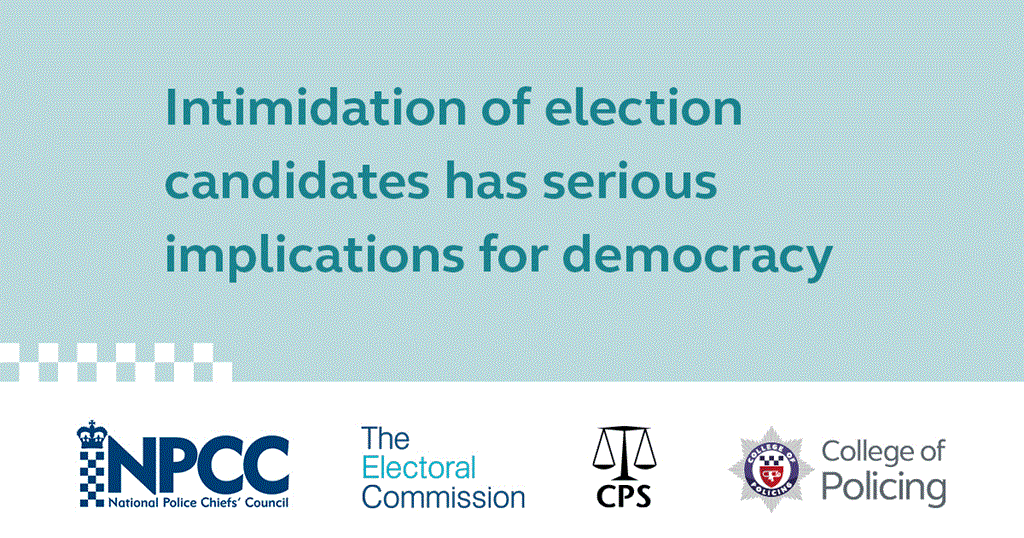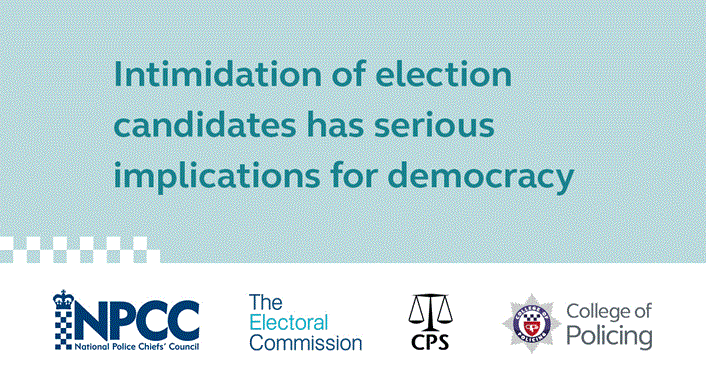
11 Dec 2019
General Election: Police forces have had direct contact with 70 per cent of election candidates about their security.
NPCC Chair encourages candidates to continue to engage with police about any concerns and report crimes.
All parties and candidates received security guidance at the start of the campaign from National Police Chiefs’ Council, in conjunction with the Electoral Commission, the College of Policing and the Crown Prosecution Service. In the period between 15 November to 4 December 2019, police election leads have had direct contact in some form with 70 per cent of candidates to discuss their security and 190 security briefings have been given to candidates and their staff.
In same period, police received nearly 200 reports related to candidate security. Most of the incidents reported are allegations of malicious communications online, but also include low level criminal damage and harassment. Just under half of all reported cases were serious enough to be treated as crimes. One third of reports are from candidate volunteers and staff.
Police have not observed abuse trends towards any single political party throughout this election period. There have been no assaults against candidates, however, there have been several assaults against candidate volunteers. These are being thoroughly investigated by the forces involved.
National Police Chiefs’ Council Chair, Martin Hewitt said:
“As with every election, police will work to prevent and detect crime and enable the democratic process to proceed unhindered. We take this role extremely seriously. Chiefs across the UK have all implemented election plans and will continue to monitor incidents and trends throughout the remainder of the election period.
“We encourage candidates and their volunteers to continue familiarising themselves with the official safety guidance and engaging with us during the rest of the campaign. Police will investigate all reports of abuse and will seek to prosecute those who act outside the law.”
Proactive police engagement with candidates during this election period:
- All election candidates were sent the joint candidate security pack when they completed their registration. Specific advice and support around online abuse and potential crimes has been provided.
- All candidates were invited to a direct security briefing to discuss safety and security issues.
- As at 04/12, 70% of candidates had direct contact at least once by forces to discuss their security. A quarter of all candidates have engaged with police directly in some way, through both verbal and written communication.
- To date, 190 direct security briefings have been hosted by police forces across the UK, with 10% of all candidates attending these in person or via their election agent.
- With the help of partners at the Electoral Commission, official candidate guidance has been sent to 64 GB political parties.
- All candidates have a specific point of contact within their force who they can approach at any time if they have any concerns or something they would like to report.
Incidents reported to police by candidates and their supporters:
- The total number of reports to police relating to candidate security from the date we released the guidance 15 November to the 4 December is 198. One third of reports are from candidate volunteers and staff, and two thirds are candidates themselves making the reports.
- The majority of incidents we’ve seen in the election period are either: not crimes (established after an initial investigation and recorded for further intelligence), malicious communications made online, alleged harassment or criminal damage.
- To date, we estimate that roughly half of the reports forces have received meet a criminal threshold, and have been formally investigated. In addition, roughly half of all incidents reported relate to malicious communications (most do not meet the criminal threshold).
- We have not observed abuse trends towards any single political party throughout this election period.
- Forces have been encouraging candidates and those representing them to report abuse they receive both online and offline.
- There have been several assaults reported to police against candidate volunteers and these are being thoroughly investigated. (There have been no assaults against candidates themselves)
Background - Explanatory notes:
- An explanation of the different types of crime which apply to the categories stated above can be found in the guidance sent to candidates. There will be a different criminal threshold for each type of criminal offence, based on its severity and the way in which a victim has been targeted.
- Forces have plans in place, as they do during every election, to police large hustings, polling stations where appropriate and the official counts.
- Resourcing decisions are made by chief constables in each force, based on an assessment of threat and risk in the force area.
Contact information
Communications office
By phone: 0800 538 5058
By email: press.office@npcc.police.uk

